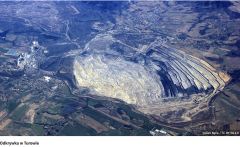Insurance of new coal projects is getting more difficult and expensive. The biggest insurance and reinsurance companies’ retreat from investing in coal is in progress. At the end of 2020 a giant in the world of coal sector insurance and reinsurance, responsible for the 40% of global energy insurance - Lloyd’s of London - adopted its first policy limiting underwriting and investments in the dirtiest of energy sectors. Surely, this decision will considerably impact Polish coal sector as well.
On December, 2, 2020, a scorecard of insurance and reinsurance companies was published, prepared by an international coalition Insure Our Future.. Since then, the group of insurance and reinsurance companies that adopted policies restricting insurance of and investment in power plants, mines and coal companies was joined by British insurance market - Lloyd’s and Korean conglomerate Hanwha Group. Thus, the number of such entities rose from 23 to 25.
As a result of social pressure, syndicates that make up Lloyd’s market are withdrawing from their engagement in risky and socially unpopular projects that destroy the climate, environment and health. Lloyd's of London announced a detailed plan until 2030 of phasing out investments in the coal sector and underwriting of coal companies and infrastructure.
According to an insurance broker, Willis Towers Watson, Lloyd’s controls 23% of the insurance market for new power projects. It’s also responsible for 40% of global energy insurance. Thereby, by the end of December 2020, the share of reinsurance companies that adopted restrictions regarding coal insurance raised above 56% from 48,3% of global reinsurance market at the beginning of December.
By January 2022, Lloyd’s and its syndicates will have finished new coal energy investments. Lloyd's will ask its syndicate members to cease to provide new insurance to coal sector companies from January 2022 in order to back out of existing insurance by January 2030.
Climate catastrophe doesn’t pay off for insurers
Decisions taken by the players such as Lloyd’s of London aren't caused by concern about the future of our planet. The insurers are more and more affected by the climate catastrophe. 2020 was record-breaking when it comes to losses caused by natural disasters. As one of the world's biggest reinsurance companies informs, losses are estimated as 210 billion $. By comparison, in 2019, they amounted to 166 billion $ and two years back, 144 billion $.
Another record of the infamous 2020 hit the wallet of insurance companies. 30 storms in the Atlantic, that is 5 more than in the most tragic until now year 2005, caused insurance losses that amounted to 83 bln $ (compared to 57 bln $ in 2019). That is why, it’s to be expected that in the future engagement of insurers in reduction of GHGs emissions will get bigger. The first step will be a departure from insuring and financing of the dirtiest companies starting with coal mines and power plants owners. Coal burning is responsible for 40% of global GHGs emissions not associated with deforestation and land-use change.
Poland is not a lonely island
With every month, we expect more policies limiting the possibility of insuring coal power plants and mines. Additionally a rising price of insurance and reinsurance will force an even quicker decrease in the new coal mines and power plants pipeline globally and speed up closure of operational coal infrastructure. The Polish coal sector is no exception. Soon it won’t be possible to insure nor reinsure the outdated coal mines and power plants fleet irrespective of the government's continued support for the coal sector.
Lloyd’s of London's new policy adoption is of great importance, especially for the future of the Polish coal sector. Lloyd's market is a main source of risk reinsurance for the biggest Polish insurer, PZU, that is also responsible for insuring a vast majority of Polish coal mines and power plants.
Just for the record: At preset, PZU is principally using the reinsurance services of British Lloyd’s market. As a member and a shareholder of syndicate 2121 on the Lloyd’s market, managed by Argent Holding, PZU has access to reinsurance services covered by high-specialized reinsurance companies operating on the U.K. Lloyd’s market.
Polish short-sightedness
In the coming years, Poland will have to phase out of coal, regardless of what the government may say about it at this particular moment. The faster companies such as PZU speak up the smaller the negative consequences for the Polish economy.
It’s high time PZU stopped participating in support of the Polish coal sector which is detrimental to the Polish economy and its competitiveness. Following the global insurance industry leaders it should immediately limit investing in and insuring power plants and coal mines. There will be a perfect opportunity to do this when PZU publishes its new strategy for the years 2021-2023. It's also high time for PGE - the biggest energy utility in Poland - stopped repeting fairy tales about Złoczew or Turów lignite mines continued operations until 2044.
Phasing out Polish coal mining and power industry by 2030 is in the interest of us all. Poland cannot afford to maintain its coal sector without a full coal phase out by 2030 a single year longer.








